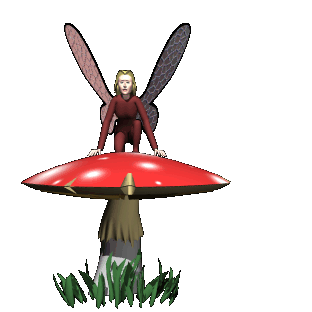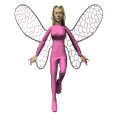Fairies
FAIRIES AND FAMILIAR SPIRITS
Articles from the Isle of ManPart 1 of 2
(From the book "Folklore in the Isle of Man" by AW Moore (1891),part of Chapter 3.

This extract has been published here with the express permission of Frances Coakley, Senior Tutor, Dept of Elec. Eng, University of Surrey, Guildford, England from whose website it was taken. The website is located atwww.manxnotebook.com/contact.htmand the book is available of CD Rom at 8 pounds stg. Contact Frances.
The belief in Fairies or Elves was formerly very prevalent in the Isle of Man, and cannot be said to have altogether died out even at the present day. The Manx conception of a Fairy seems to be very much the same as that in other Celtic lands, with, perhaps, a tinge of the somewhat more sombre Scandinavian superstition.
They are supposed to be like human beings in form and feature, though very much smaller and more delicately constructed. At a distance they seem to be handsome, but on closer inspection they are often found to be decrepit and withered. They are usually represented - as being clad in blue or green, with red peaked caps.
They live in green hill sides, more especially affecting the ancient tumuli. Any one straying near these on a fine summer's evening would probably hear delightful music; but he must take care, especially if he is a musician, not to linger lest he should be entrapped. Sometimes, too, they may be seen playing like children, or dancing, the rings seen on the grass being caused by this; at other times feasting. They hunt, being for the most part very furious riders.
They are partly human and partly spiritual in their nature, and are visible to men only when they choose. Some of them are benevolent, curing men of diseases and delivering them from misfortune. Others are malevolent, stealing children, even abducting grown people, and bringing misfortune. The flint arrow heads which are occasionally picked up, are the weapons with which the Fairies avenge themselves upon human beings who had wronged them.
Their impact is not felt, and does not break the skin, but a blue mark is found on the body of the victim after death.
The good Fairies are, fortunately, more powerful than the bad, and will enable those who are considerate in their behaviour to them to prevail over the latter.
It is, therefore, very desirable to keep on good terms with them, and to propitiate them by taking care not to wound their feelings; with this view, they are called "the little people," or "the good people," the word Fairy being never mentioned, as they are supposed not to like it. Indeed, the Manx word Ferrish is merely a recent corruption of the English word, there being no such word in the Manx language 150 years ago.
It was an old custom to keep a fire burning in the house during the night, so that the Fairies might come in and enjoy it. If any one was rash enough not to do this, or to abuse them in any way, he would be sure to suffer for it. It was also customary to leave some bread out for the Fairies, and to fill the water crocks with clean water for them before going to bed.
This water was never used for any other purpose, but was thrown out in the morning. The Manx women, formerly, would not spin on Saturday evenings, as this was deemed displeasing to the Mooinjer- Veggey (Fairies), and at every baking and churning a small bit of dough and butter was stuck on the wall for their consumption. Besides keeping on good terms with the benevolent Fairies, there are various other methods of defeating the machinations of the malevolent ones.
Among these are the incantations and herbs got from men and women who had acquired the reputation of being Fairy Doctors, or Charmers, though their nostrums were usually applied to the cure of cattle. One of the most renowned of these practitioners, Teare of Ballawbane, told Train, in 1833, that the malevolence of the Fairies had caused the seed potatoes to become tainted in the ground, and, in order to convince him that this was the case, he said that all the potatoes which he had taken under his protection had vegetated vigorously.
But there are methods for protecting human beings and animals against Fairies, which are so well known that there is no need to apply to a Charmer before applying them. Thus, salt is very efficacious, and so is iron. It was necessary to take great care of children, especially before baptism, as one of the commonest actions of the malevolent Fairies is to steal children.
If a child were taken away, a decrepit and emaciated Fairy would be found in its place, and the prettier the child, the greater the risk of this. One way of preventing this catastrophe was to lay an iron poker, or other iron implement, on the child when left alone, another was to tie a red thread round the child's neck, and when taking her child to be christened, a woman would take a piece of bread and cheese with her, which she gave to the first person she met for the same purpose.
Another protective measure, both for human beings and animals, is to have the cuirn, or mountain ash, in the form of a cross, made without a knife, put over the threshold of their dwellings. Flowers growing in a hedge, especially if yellow, are also useful in this respect, and ploughmen were wont to throw chamber lee over their ploughs to protect them.
On Midsummer Eve, when their power is at its height, flowers and herbs are the only barriers to their incursions, and these are regularly spread at the doors of the houses to protect the inmates. They are also supposed to be always abroad during the harvest moon; and many stories are related of their excursions through the Island, and particularly of their merry-makings in Glentrammon.
The interior of Fairy Hill, in Rushen, is supposed to be the palace of the Fairy King, and many a tale was told of the midnight revels of the fairy court of Mona.
Fairy Music

Such a soft floating witchery of sound, As twilight elfins make, when they at eve Voyage on gentle gales from fairyland.–Coleridge. An English gentleman, the particular friend of our author, to whom' he told the story, was about passing over Douglas Bridge ~before jt was broken down, but the tide being high he was 'obliged to take the river, having an excellent horse under him and' one accustomed to swim.
As he was in the middle of it he heard, or imagined he heard, the finest symphony, he would not say in the world, for nothing human ever came up to it.
The horse was no less sensible of the harmony than himself, and kept in an immoveable posture all the time it lasted; which, he said, could not be less than three-quarters of an hour, according to the most exact calculation he could make when he arrived at the end of his little journey and found how long he had been coming. He, who before laughed at all the stories told of fairies, now became a convert, and believed as much as ever a Manxman of them all.– Waldron.
The Fairy Horse Dealer

A Manxman, who had the reputation of the utmost integrity, being desirous of disposing of a horse he had at that time no great occasion for, and riding him to market for that purpose, was accosted, in passing over the mountains, by a little man in a plain dress, who asked him if he would sell his horse. "'Tis the design I am going on," replied the person who told the story. On which the other desired to know the price. "Eight pounds," said he.
"No," resumed the purchaser, "I will give no more than seven; which, if you will take, here is your money." The owner thinking he had bid pretty fair, agreed with him, and the money being told out, the one dismounted and the other got on the back of the horse, which he had no sooner done than both beast and rider sunk into the earth immediately, leaving the person who had made the bargain in the utmost terror and consternation.
As soon as he had a little recovered himself, he went directly to the parson of the parish, and related what had passed, desiring he would give his opinion whether he ought to make use of the money he had received or not.
To which he replied that, as he had made a fair bargain, and in no way circumvented, nor endeavoured to circumvent, the buyer, he saw no reason to believe, in case it was an evil spirit, it could have any power over him. On this assurance, he went home well satisfied, and nothing afterwards happened to give him any disquiet concerning this affair.– Waldron.
© 2021 by Malcolm Qualtrough, Elizabeth Feisst and the late John Karran Qualtrough.
Hosted by Ask Web Design, Isle of Man.
© Copyright by Malcolm Qualtrough, Elizabeth Feisst and the late John Karran Qualtrough.